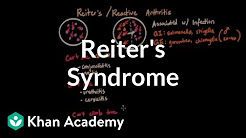Reactive arthritis is an inflammatory type of arthritis which affects the joints, and may affect the eyes, skin and urinary tract (bladder, vagina, urethra).
Learn about reactive arthritis, a chronic, systemic rheumatic disease. Reactive arthritis used to be called Reiter syndrome. Read about treatment, prognosis, symptoms, causes, and diagnosis.
Post Traumatic Arthritis Finger Please enable Javascript to watch this video GRAND RAPIDS, Mich. — FOX 17 talks with orthopedic surgeon Dr. Levi Hinkelman about treating hand and finger arthritis in this week’s Medical Moment. Post-traumatic arthritis: Arthritis developing following an injury to hand, wrist or elbow is called as post-traumatic arthritis. The condition may develop. Psoriatic arthritis: This
Information for patients with reactive arthritis: what it is, common causes, who it affects, getting diagnosed and treatment options.
Search About Disease Causes & Remedies. Know Expert Advice, Reviews & More.
The safety profile for patients with psoriatic arthritis (PsA) treated with CIMZIA ® was similar. evidence of AS but with.
Does Drinking Milk Cause Arthritis Drinking milk or eating beef could cause rheumatoid ARTHRITIS, scientists warns. A University of Central Florida team discovered that bacteria commonly found in milk. Feb 6, 2018. Rheumatoid arthritis, which affects nearly 1.3 million adults in the US, is an autoimmune and inflammatory disease that can cause long-lasting or chronic pain and deformity. The condition
Reactive arthritis is a painful type of inflammation that can occur in the legs and back. Find out about the symptoms and how to treat this condition.
Oct 30, 2016. What is reactive arthritis? It is caused by an infection and results in joint pain and swelling. You may also have red, swollen eyes and a swollen urinary tract.
 A Selective Inhibitor of Human C-reactive Protein Translation Is Efficacious In Vitro and in C-reactive Protein Transgenic Mice and Humans – 1 Department of Medicine, Division of Clinical Immunology and Rheumatology, The University of Alabama at.
A Selective Inhibitor of Human C-reactive Protein Translation Is Efficacious In Vitro and in C-reactive Protein Transgenic Mice and Humans – 1 Department of Medicine, Division of Clinical Immunology and Rheumatology, The University of Alabama at.
Reactive Arthritis: What is It & Natural Remedies. – Reactive Arthritis: What is it and Causes: Sometimes arthritis develops not as a chronic, degenerative disease which you may have to manage for the rest of your life, but rather.
Reactive arthritis is a form of arthritis (joint inflammation) caused by an infection elsewhere in the body. In the case of foodborne pathogens (Campylobacter, E. coli, Salmonella, Shigella and Yersinia), the infection starts in the intestines, generally the colon.
Reactive arthritis is an uncommon condition that can make your joints swell and hurt, similar to the pain of arthritis. “Reactive arthritis” means your immune system is reacting to an infection you already had. One kind of reactive arthritis is.
Reactive arthritis involves painful swelling in the joints that is caused by an infection in another part of the body, most often the urinary tract, genitals or intestines. The joints in the knees, ankles and feet are typically the prime target for the disease.
Arthritis Hot Deep Penetrating Pain Relief Cream Great prices & low shipping Coupon Code “5Off” for 5% Off! Rheumatoid Arthritis Images In Hands Rheumatoid arthritis | Radiology Reference Article. – Rheumatoid arthritis (RA) is a chronic autoimmune multisystemic inflammatory disease which affects many organs but predominantly attacks the synovial tissues and joints. Auto-injectors are used for treatment of anaphylaxis, multiple sclerosis, Rheumatoid
Reactive arthritis is a form of arthritis, or joint inflammation, that occurs as a "reaction" to an infection elsewhere in the body. Inflammation is a characteristic reaction of tissues.
Reactive Arthritis Center Reactive arthritis is a chronic, systemic rheumatic disease characterized by three conditions, including conjunctivitis, joint inflammation, and genital, urinary, or gastrointestinal system inflammation.
Reactive arthritis, formerly known as Reiter's syndrome, is a form of inflammatory arthritis that develops in response to an infection in another part of the body ( cross-reactivity). Coming into contact with bacteria and developing an infection can trigger the disease. By the time the patient presents with symptoms, often the.
